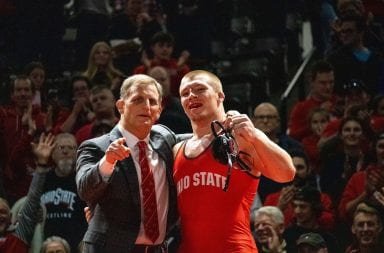Patience is a virtue.
And many professional sports franchises seek out virtuous athletes who don’t stray on the edge of the law.
In the NFL, character plays a major role. Just ask Ben Roethlisberger, Michael Vick or Adam “Pacman” Jones. More and more, teams avoid high-risk athletes who pose off-the-field threats.
The NCAA suspended Oklahoma State’s Dez Bryant, widely projected as the NFL Draft’s top receiver last April, for the final 10 games of the season after he met with former NFL cornerback Deion Sanders. The interaction was determined to be a violation of NCAA rules.
Once pinpointed as a Top 5 pick, Bryant tumbled to the Dallas Cowboys, who selected him 24th overall. Coincidence? Hardly.
Bryant’s situation is just one example of the transgressions running rampant across college athletics.
Georgia’s A.J. Green, tabbed by many as the best receiver prospect in college football, is serving a four-game suspension for selling his own jersey on eBay. Reports indicate he made about $1,000 on the game-worn uniform.
So only the university can profit from Green’s gear? He can’t see a penny of it?
That’s the straight-edged policy the NCAA institutes to prevent widespread financial madness. Aside from the athlete’s relatives, how many people would pay for a game-worn field hockey jersey?
If all student-athletes are to be treated as equals, then star football players can’t be earning a profit that’s unattainable for a rower or volleyball player.
Green likely chose eBay as his selling medium because of the high demand for his product.
But since the revenue that football brings schools dwarfs the money that other sports make, shouldn’t the athletes see a cut? What if the family of a star athlete can’t provide sufficient monetary support?
I sat down with Ohio State athletic director Gene Smith and discussed this very issue.
Many people identify athletic directors and NCAA bigwigs as the villains, poaching every nickel and dime spent to see the kids play. But the same kids that are the reason 100,000 people fill stadiums across the nation are the same ones that will earn millions on the next level.
Smith was actually in favor of allowing the athletes to earn a portion of the sales of their merchandise. His caveat, however, was that the athlete had to graduate to ever get his or her hands on the account.
“Should we be able to allow kids to sell jerseys or their likenesses and make money? I believe that,” Smith said. “But I believe that money should be saved in an account for them for when they graduate. If you open that door and you allow every kid to monetize their persona, holy smokes.”
“So I’m good with it if we said, whatever a kid’s jersey value is you sell it, but you take a portion of that money because you have expenditures, you take the profit from it, and put it in an account. I wouldn’t give it to them unless they graduate.”
The concept makes sense. The star athletes who don’t need all four years of college game experience — and who don’t want to risk injury — jump to the next level and the money in their account is returned to the school.
It sounds like a feasible plan, though one would be naïve to expect agents and boosters to keep from finding ways to trump the system.
And that’s why the NCAA enforces such strict policies. Every other scenario includes far too many loopholes, exceptions and gray areas.
Smith’s idea would work, but only in a perfect world. And what we currently have is an imperfect setup in an imperfect system.
So, the best college athletes can do for now is just have patience and wait for that first, legal paycheck, whether from the NFL or a job post-graduation.


